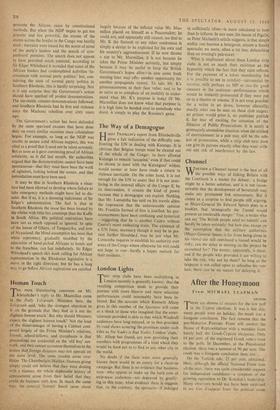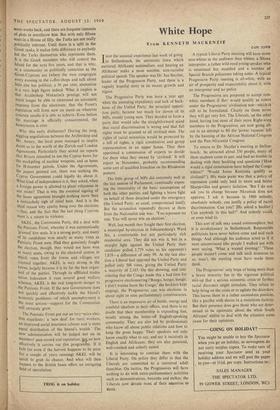After the Honeymoon
From MICHAEL LEAPMAN
THERE are dozens ut excuses for the low poll in the Cyprus elections. It was a hot day, many people were on holiday, the result was a foregone conclusion. The fact remains that the pro-Makarios Patriotic Front will control the House of Representatives with a mandate from barely half the Greek-Cypriot electorate. Only 64 per cent. of the registered Greek voters went to the polls. In December, at the Presidential election, there was a turnout of 90 per cent. The result was a foregone conclusion then, too.
On the Turkish side, 25 per cent. abstained. Here, although the official National. Front won all the seats. there was quite considerable support for independent candidates—a symptom of the growing opposition to Dr. Kutchuk's leadership. Many observers, would not have been surprised to see him LI:cappear from the political scene some weeks back, and there are frequent rumours of plots to overthrow him. But with only fifteen seats in a House of fifty, the Turks are not really Politically relevant. Until there is a split in the Greek ranks, it makes little difference to anybody but the Turks themselves who represents them. It is the Greek members who will control the Island for the next five years, and that is why, in a community as politically conscious as the Greek-Cypriots are (where the men congregate every evening in the coffee-shops and talk about little else but politics), a 36 per cent. abstention is a very high figure indeed. What it implies is that Archbishop Makarios's prestige will not much longer be able to command an automatic response from the electorate; that the Front's reputation will from now on stand on whatever concrete results it is able to achieve. Even before the marriage is officially consummated, the honeymoon is over.
Why this early disillusion? During the long, niggling negotiations between the Archbishop and Mr. Amery, the local press managed to inspire doubt as to the worth of the Zurich and London Agreements. Particularly they seized on reports that Britain intended to use the Cyprus bases for the stockpiling of nuclear weapons, and as bases for H-bomber patrols. Under the Agreements, the papers pointed out, there was nothing the Cyprus Government could legally do about it. What kind of independence is it, they asked, when a foreign power is allowed to plant volcanoes in our midst? That is why the eventual signing of the bases agreement brought ,nothing more than a melancholy sigh of relief here. And it is the chief reason why apathy hung over the elections —that, and the fact that the last thing Cypriots want is a return to violence.
AKEL, the Communist Party, did a deal with the Patriotic Front, whereby it was automatically granted' five seats. It is a strong party, and many of its candidates won nearly as many votes as Patriotic Front men. Had they genuinely fought the election, though, they would not have won as many seats, owing to the electoral system in which votes from the towns and villages are Counted together. AKEL is very strong in the towns, largely because it is by far the best organ- ised of the parties. Through its affiliated trades union federation it runs several good welfare- schemes. AKEL is the real long-term danger to the Patriotic Front. If the new Government does not quickly and effectively tackle the Island's economic problems—of which unemployment is the most serious—support for the Communists will certainly grow.
The Patriotic Front put out an im,4•;‘ssive elec- tion manifesto: a 'new deal' for rural workers, an improved social insurance scheme and 'a more equal distribution of the Island's wealth.' The new administration will be judged not on its members' past record and reputation, kon how effectively it carries out this progranine. If it fails (or even if the harvest happens to be poor for a couple of years. running) AKEL will be quick to grab its chance. And what will then happen to the British bases offers an intriguing field of speculation.
TROG is on holiday



































 Previous page
Previous page